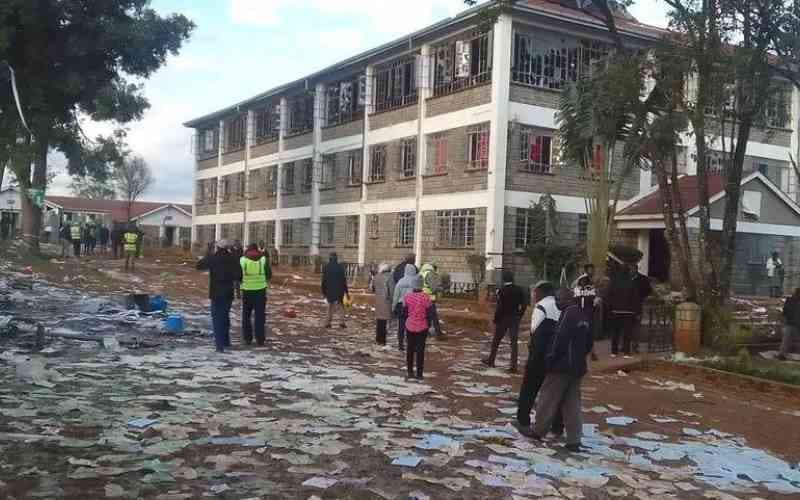We're loading the full news article for you. This includes the article content, images, author information, and related articles.
Litein Boys High School in Kericho County was shut down after students went on a rampage, destroying property and injuring a guard; authorities say the closure protects learners ahead of national exams.

Kericho, Kenya – September 21, 2025.
Litein Boys High School in Kericho County has been closed indefinitely after students went on a violent rampage late Sunday evening, destroying classrooms, dormitories, and laboratories and injuring a watchman. Police used tear gas to quell the unrest as terrified residents gathered outside the school to witness the chaos. Education officials and security agencies have since launched a joint investigation to uncover the causes and masterminds behind the violence, which has once again brought the issue of school unrest into the national spotlight.
This marks the third time in two years that Litein Boys High School has been rocked by violent strikes. Previous incidents in July 2024 and in 2023 caused property damage worth millions of shillings and left parents and education officials grappling with questions over discipline, leadership, and school infrastructure.
The school, located in Bureti Constituency, is one of Kericho’s largest boarding institutions and has consistently sent a significant number of candidates to national universities. Yet, rising unrest across Kenyan secondary schools has led education stakeholders to warn that deeper, systemic problems—ranging from exam pressure and poor communication to substance abuse and student activism—are being ignored.
Nationally, data from the Kenya Secondary Schools Heads Association (KSSHA) shows that more than 25 schools experienced strikes or attempted arson attacks in the last academic year alone, often disrupting national exam timetables and costing the government and parents millions in repairs.
Witnesses say the Litein Boys unrest began around 8:30 p.m. when groups of students started pelting stones at windows and setting parts of the dormitory on fire. Police officers from Bureti Police Station arrived minutes later and fired tear gas to disperse the rioting students.
Sion Sub-County Police Commander Lawrence Kisini confirmed that one school watchman suffered head injuries while trying to prevent students from accessing the staffroom. “We have launched investigations, and several students will be questioned to establish the motives behind this chaos,” Kisini told reporters.
The Board of Management (BoM) announced the school’s immediate closure after an emergency meeting attended by parents, education officers, and local administrators. BoM chairperson Esther Rono said preliminary reports indicated the unrest was triggered by grievances over exam schedules, school rules, and alleged mistreatment by some teachers.
“We cannot continue exposing students and staff to this level of danger,” Rono said. “The school will remain closed until security agencies and education officials identify the culprits and recommend long-term solutions.”
The destruction at Litein Boys High School is expected to cost millions of shillings in repairs, adding to the already strained budgets of boarding schools struggling with delayed capitation funds from the national government.
Parents fear that the Kenya Certificate of Secondary Education (KCSE) candidates will be the biggest losers if learning time is not recovered before exams scheduled for November. The Kenya National Examinations Council (KNEC) has not yet commented on whether the incident will affect KCSE timetables but has in the past warned schools against creating unnecessary disruptions.
Local businesses in Bureti Constituency, which rely on the school for supplies, also face indirect losses as the indefinite closure halts normal operations.
The Litein Boys incident has reignited a national debate on student discipline, mental health, and the role of school administrations in preventing unrest.
Kenya Secondary Schools Heads Association chairperson Indimuli Kahi has previously urged the government to fund counselling services in boarding schools, noting that exam pressure, lack of recreational facilities, and authoritarian school rules often spark violent protests.
Parents’ associations, meanwhile, have called for more dialogue between school administrations and students, warning that harsh disciplinary measures alone cannot address underlying frustrations.
The Ministry of Education has dispatched a crisis team to assess the damage at Litein Boys High School and recommend measures before the school reopens. Education Cabinet Secretary Julius Migos Ogamba is expected to tour the institution later this week amid calls for a national task force on student unrest.
Police have promised a thorough investigation to identify the masterminds behind the riots. Students found culpable could face expulsion or prosecution under the Education Act and the Penal Code.
Long-term proposals include:
Expanding mental health and counselling programmes in boarding schools.
Reviewing school management practices to encourage dialogue.
Building better recreational and academic facilities to reduce student frustrations.
Strengthening early-warning systems for detecting potential unrest.
As Litein Boys High School remains deserted, parents, teachers, and policymakers are left confronting tough questions about the future of student discipline in Kenya’s boarding schools. Whether this latest incident leads to lasting reforms—or simply fades into another cycle of violence and closure—will depend on how decisively the government, communities, and school administrations act in the coming weeks.
Keep the conversation in one place—threads here stay linked to the story and in the forums.
Sign in to start a discussion
Start a conversation about this story and keep it linked here.
Other hot threads
E-sports and Gaming Community in Kenya
Active 9 months ago
The Role of Technology in Modern Agriculture (AgriTech)
Active 9 months ago
Popular Recreational Activities Across Counties
Active 9 months ago
Investing in Youth Sports Development Programs
Active 9 months ago
Key figures and persons of interest featured in this article